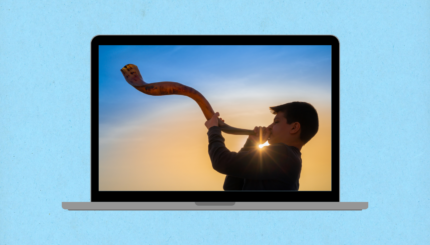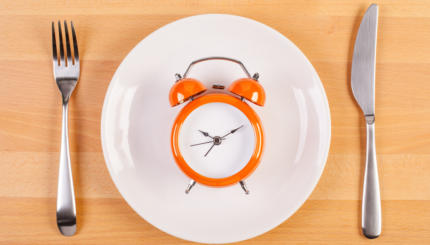This year’s school calendar arrived in the mail. We noticed that they hadn’t included any teacher days off for “professional development.” While that ostensibly meant less of a need for Monday afternoon childcare, Regina and I still felt disappointed. We’d planned to take our son to Disneyland on his September free day. At California amusement parks, only a mid-week non-holiday ensures short lines and crowds that won’t explode your brain. Now, with school meeting nearly every day in fall, Regina tried to find an acceptable substitute.
“We could take him on Yom Kippur,” she said.
I reacted immediately, with maximum emotional violence.
“Are you out of your mind?” I said. “You can’t go to Disneyland on !”

Help us keep Jewish knowledge accessible to millions of people around the world.
Your donation to My Jewish Learning fuels endless journeys of Jewish discovery. With your help, My Jewish Learning can continue to provide nonstop opportunities for learning, connection and growth.
“Why not?” she said. “It’s open.”
“Yeah,” I said. “But it’s Yom Kippur! That’s just not appropriate.”
“Come on. You hate Yom Kippur. You don’t do anything on Yom Kippur.”
“That’s not the point! Would you take Elijah to Disneyland on Easter?”
My wife, if you hadn’t guessed, isn’t Jewish.
“I might,” she said.
“Well, that’s your mishegas,” I said. “Under no circumstances would I ever go to Disneyland on Yom Kippur.”
“Fine,” she said. “Elijah and I will go, and you can stay home by yourself and atone for your sins.”
“Or commit some,” I said.
“My point exactly.”
*****
It wouldn’t be fair to call me a non-observant Jew. I lead my extended family’s first-night Passover seder every year. When we light Hanukkah candles, I force my half-breed to sing Maoz Tzur. I belong to Jewish cultural organizations and mailing lists and know the meaning of the phrase tikkun olam. Certain scenes in Barry Levinson’s Avalon bring me to tears. But when it comes to the High Holidays, and, in particular, Yom Kippur, I’m about as Jewish as the guy behind the counter at my neighborhood bodega.
Yom Kippur Memories
My childhood High Holidays were dreary, context-less affairs, performed at a downtown Phoenix theater-in-the-round, featuring a drippy slideshow of various nature scenes accompanied by a recording of Cat Stevens singing Morning Has Broken. No one ever revealed to me how that symbolized or Yom Kippur, but clearly, someone at Temple Beth Israel liked Cat Stevens. Eventually my father, raised to believe that synagogue meant something more than low-fi entertainment, had enough of this Reform community. We switched to the Conservative services, which were even worse. At least the Reform services had cute girls and nice cushioned seats. At the Conservative services, you could barely hear the rabbi over all the snoring.
Every year, we went to the same break-fast at my father’s business partner’s house. The children were older, they had no toys, and the buffet always featured the world’s largest salmon mousse. Some time after my Bar Mitzvah, my parents switched temples again, and they dragged my sisters and me along with them no matter what. Every year, it got less interesting. But on the High Holidays, my mother said, you go to services. It’s something that you do.
When I went off to college I dragged myself, sometimes during new student week, to High Holiday services in an acoustically perfect concert hall, where even an hour of my devout time felt like a prison sentence. After a couple of years of this, I published an essay in a campus magazine talking about how alienated I felt as a Jew. This got me a call from the campus rabbi, who somehow saw in my confusion the opportunity to breed a new generation of campus Jewish leaders.
But that didn’t work. As I entered adulthood, I completely knocked the High Holidays off the calendar. No one invited me to their break-fasts or their Rosh Hashanah dinners. Some years, passed without occurring to me at all, unless it involved interruptions to Shawn Green’s playoff schedule. For so many reasons, Yom Kippur stayed off the docket. Tickets are too expensive. I don’t like waking up in the morning and putting on a suit. I get really grumpy when I fast.
Atoning for What?
Most importantly, I realized, I simply don’t buy what the holiday has, theologically, to offer. It’s hard to atone for your sins when you don’t believe in the concept of sin, and particularly not in the concept of sin when bundled into a mass confessional before a basically uncaring judge who decides, one day a year, whether or not you’re going to live or die. Perhaps, in a certain cultural context, that made sense once upon a time, but it doesn’t now, at least not to me.
These aren’t excuses so I can behave badly. If anything, over the last few years my dedicated practice of yoga has imbued my life with a stronger ethical context than before, if not a strictly theological one. One of the challenges of yoga is to live according to the yamas–core ethical principles for making a happier world, including non-stealing, respect for others, sexual fidelity, and other stuff that, had it not been written at least 1000 years before the Old Testament, could have been lifted straight out of the, Ten Commandments.
I realize that trying to live according to ethical principles isn’t the same as wiping the slate clean of “sin” every year. Still, I just can’t deal with synagogue. Do I really need to make myself extra-miserable because in the last year I smoked pot, looked at porn, and ran a stop sign in May? I don’t even feel sorry for the first two things.
But maybe I’ve just not thought deeply enough about the real point of Yom Kippur. Is it possible that Yom Kippur exists to make you think about how to live your life well, not to force you to wear an itchy sports coat and enact rituals that you don’t particularly understand? If that’s the case, it’s a sneaky holiday indeed. But at least I’ll have something to do while my family goes to Disneyland.



